Cucumber is one of the most popular vegetables in the world. It has a light, refreshing taste and can be used as an ingredient in many dishes. Can guinea pigs eat cucumbers?
This question may seem like it’s easy to answer, but there are actually some important things you need to know before feeding them this delicious vegetable.
So, you have a guinea pig and it’s been eating the same things every day for the past few weeks. How do you mix up their diet? Well, one great way to add variety is by adding cucumber!
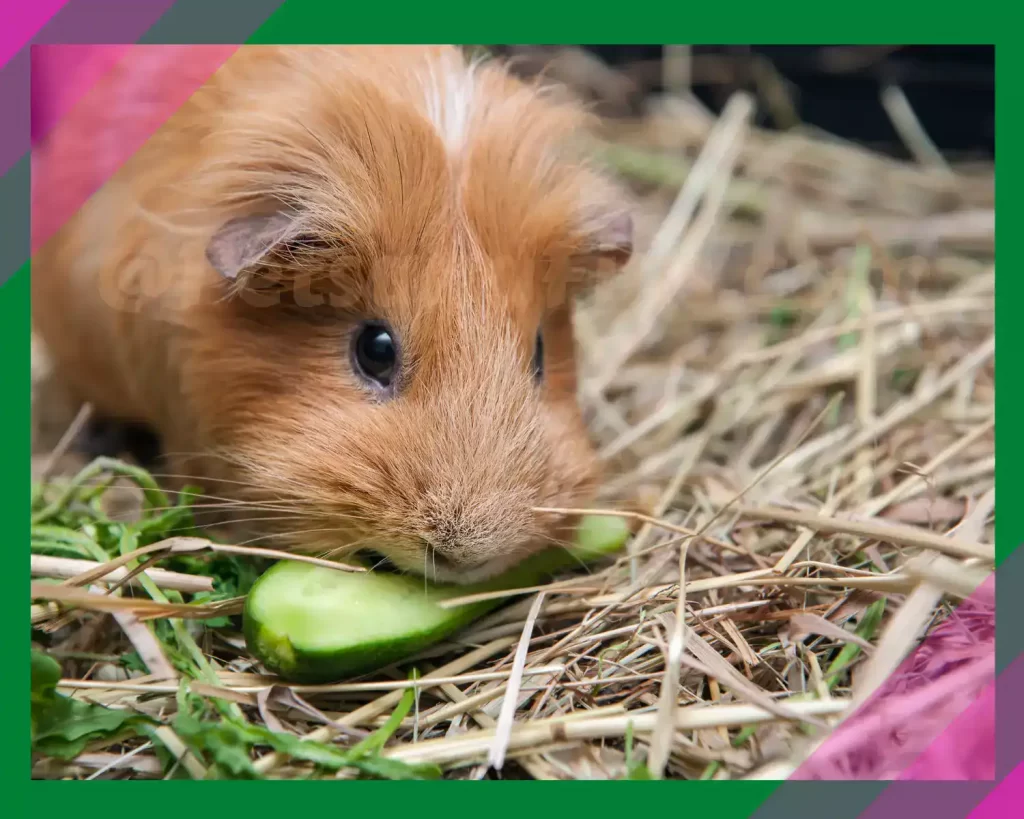
Cucumbers are low in calories and high in fiber, so they can be given as an occasional treat. They also contain water, which will keep your cavy hydrated. Of course, if your pet isn’t used to something new like cucumbers, then give them some time before introducing this healthy food into their diet.
The most important thing to remember about feeding any animal is that what works for one may not work for another. Not all animals are picky eaters, but they need different nutrients based on their species.
What Exactly Are Cucumbers?
Cucumbers, scientifically known as Cucumis sativus L. (Cucurbitaceae), are a popular vegetable that originated in India and spread to the rest of Asia and Europe.
They grow on vines and have bumpy skin with tiny soft prickles, which is why some people wear gloves when harvesting them from the vine- although most of these will fall off during growth, so it’s safe for humans to pick them by hand!
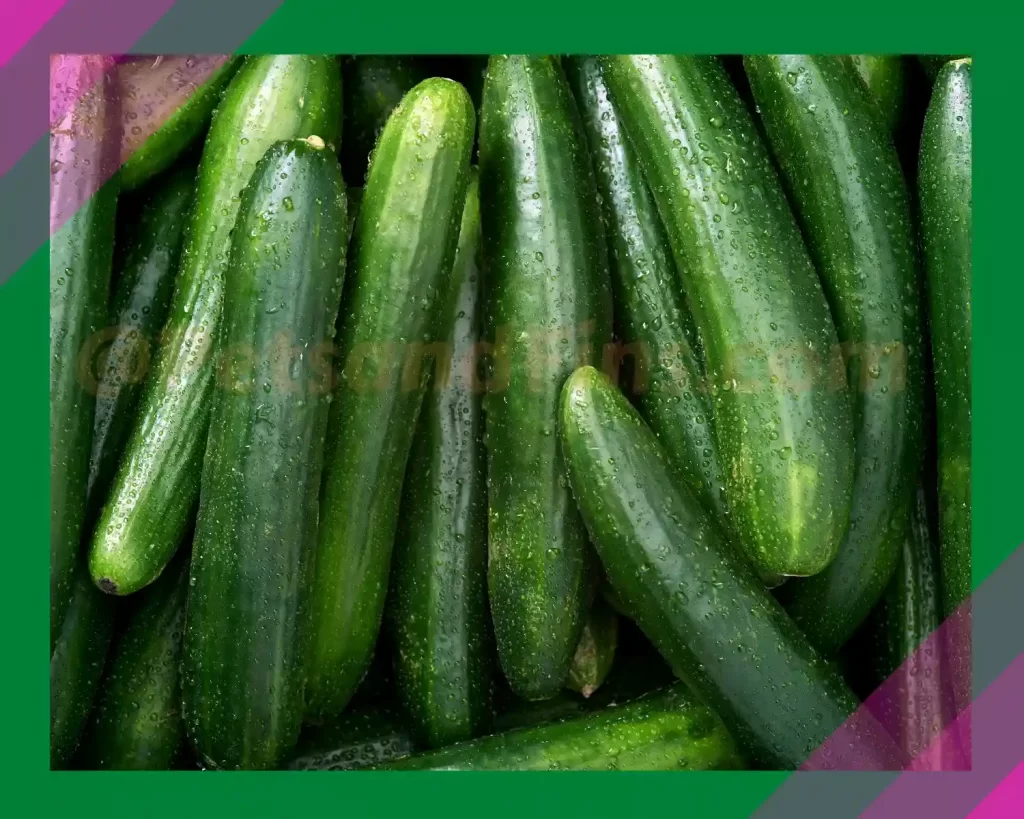
Cucumbers are actually a fruit, but they’re generally treated as a vegetable.
While it has been cultivated for thousands of years in Asia, today this green veggie is grown all over the world from Europe to Australia. This popular summertime snack can be eaten raw or cooked- although some people prefer them pickled.
Nutritionally speaking, these delicious veggies contain high amounts of vitamins A, B, and C. They’re rich in minerals like calcium, iron and magnesium as well.
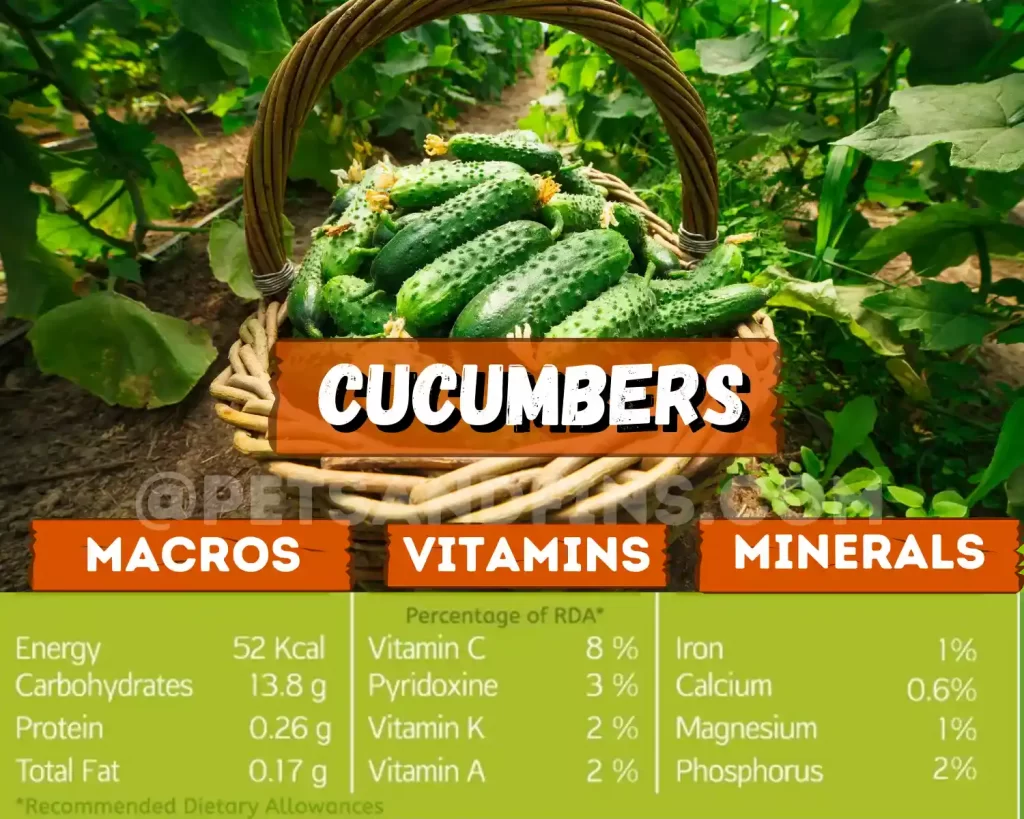
Can Guinea Pigs Eat Cucumbers?
Well, the answer is yes! Cucumber is an excellent treat for your furry friend. It’s low in calories and high in nutrients. They’re also a great way to occupy your pet while you’re cooking dinner or cleaning up around the house.
Just make sure that any pieces are small enough to fit through their little mouths!
Cucumbers are a great source of vitamins A and K, which are important for their diet. But there’s something else you need to know before feeding them- they’re 98% water! So instead of giving your piggies a whole cucumber at once, try giving them just a few slices.
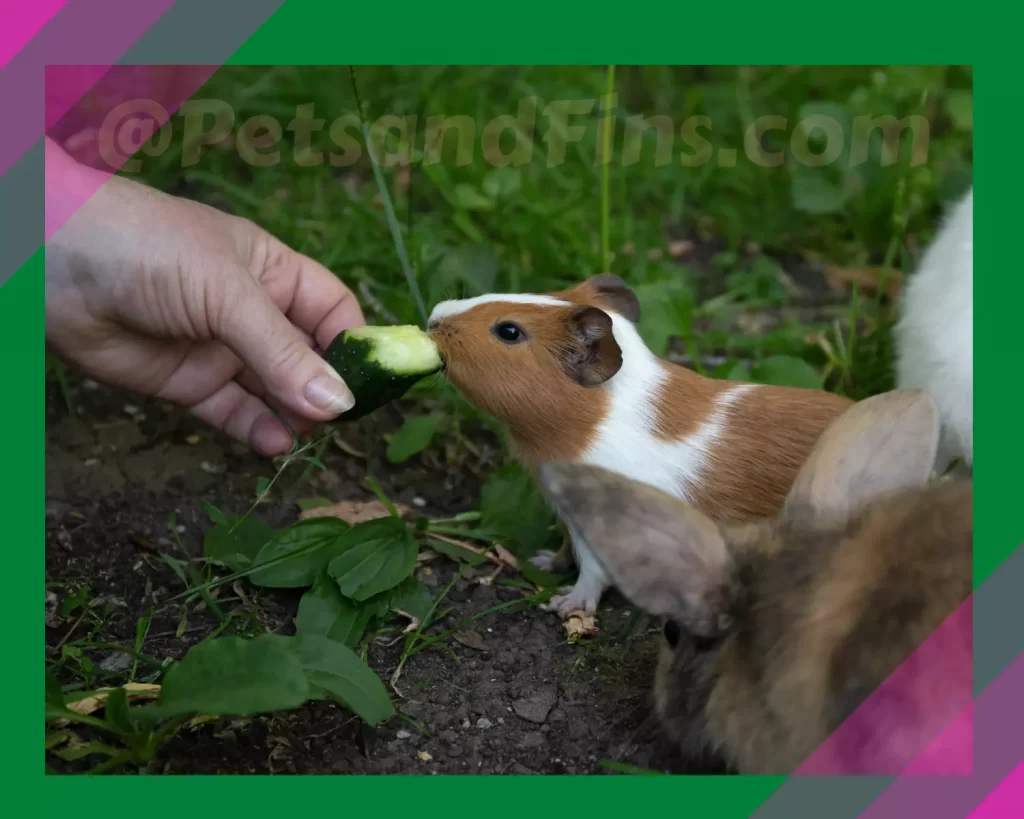
Cucumber is a great fruit to give your guinea pig. It’s easy for them to digest and it doesn’t have any major allergens.
However, cucumbers can get pretty mushy when left out too long, so it might be best to keep the skin on until you’re ready for some cucumber crunchies!
The other thing that I want to mention is that they can’t eat too much of this vegetable because cucumbers are high in water content, which means more peeing! But if you watch them closely, you’ll know how much they can handle 🙂
Benefits Of Cucumbers For Guinea Pigs?
The benefits of feeding your pet with cucumbers include:
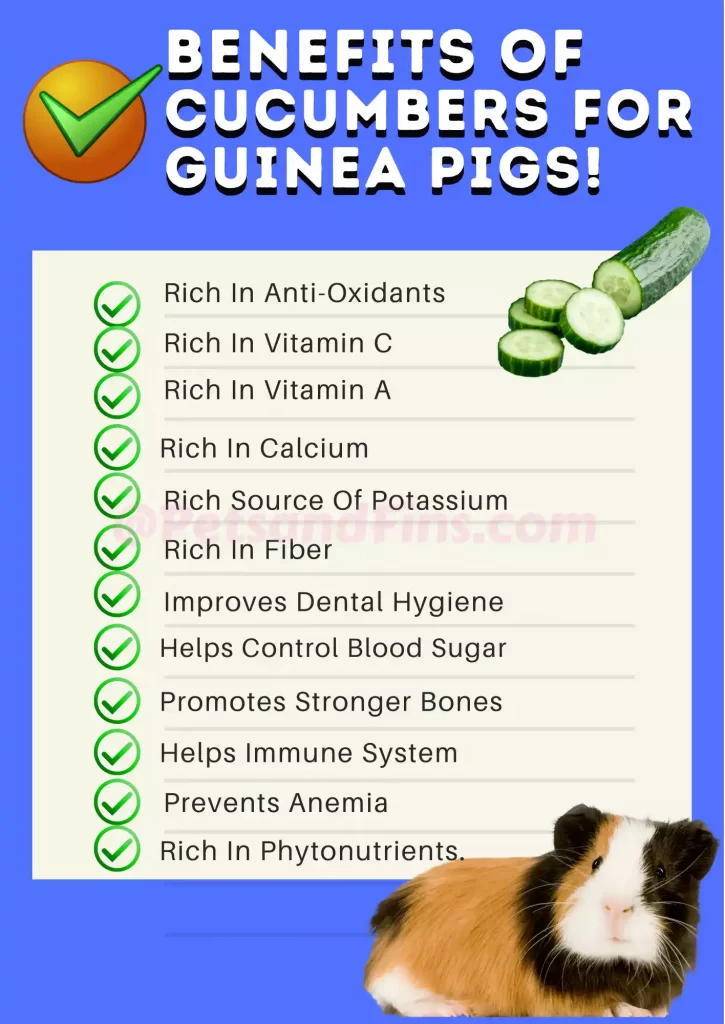
- Helps In Hydration:Cucumbers contain about 97% water.Because they’re mostly made up of water, you can also use this fruit as a way to keep your piggy hydrated, especially on hot summer days or after exercise when they might be more prone to dehydration.
- Great Source Of Antioxidants:These tasty veggies have lots of antioxidants that boost the immune system so your cavy will be healthy and happy!
- Cucumbers Can Help In Weight Loss:If you’re noticing that your guinea pig is gaining a little too much weight, then this fruit can help in losing those extra pounds.
- Helps Ease Constipation:Cucumbers contain both insoluble and soluble fibers which help to bulk up food contents inside their stomachs, thus relieving constipation. It’s also rich in potassium, which acts like a natural diuretic- flushing out excess water weight through urination.
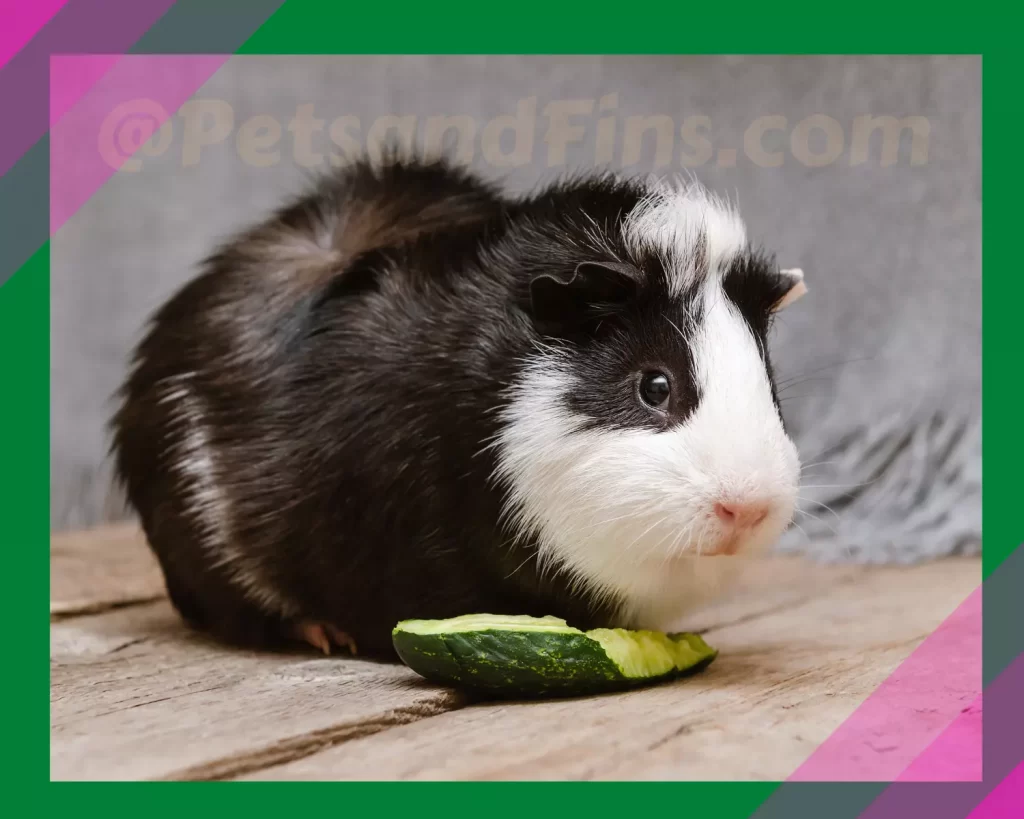
This means that the next time you find your furry friend struggling with a case of constipation, try giving them some cucumber slices.
- Improves Dental Health: Cucumbers are rich in dietary fiber which can help to naturally brush off their teeth and gums as they chew on it. This reduces plaque buildup and prevents oral disease from setting in. Can’t forget that this fruit has been known to reduce bad breath too!
- Helps Relieve Stress On Pets Who Are On A Diet: If you’re noticing that your guinea pig is gaining a little too much weight, then this fruit can help in losing those extra pounds!
- Helps In Digestion: Cucumbers have pectin, which is great for helping keep food contents moving smoothly through the digestive tract- preventing any potential bloating or gas buildup later on down the road when things get stuck inside. It also contains insoluble fibers which help bulk up stools, making them easier to pass.
- Can Be A Great Treat: We all know that guinea pigs love their veggies and fruits, but sometimes we need an occasional treat, right? How else would you get them to do tricks in the circus! Get creative with it by adding cucumber slices into your piggie’s maze toy, for example.
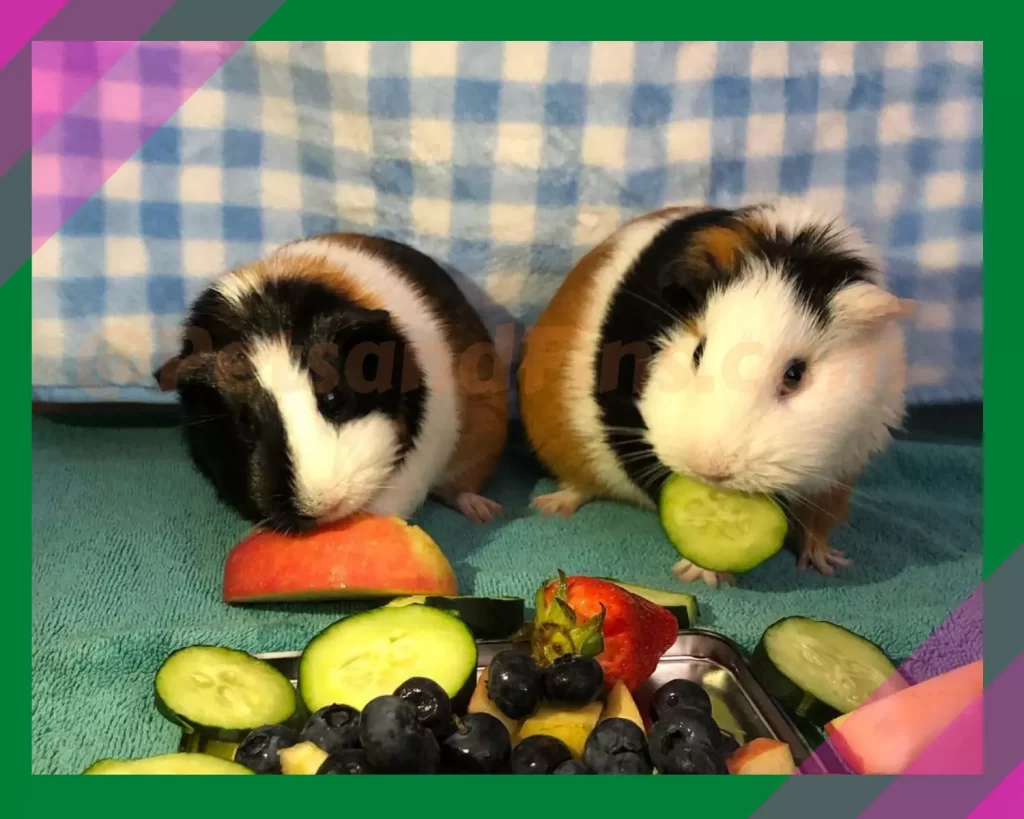
- Absorption Of Harmful Toxins:Furthermore, these kinds of fiber act like a sponge by absorbing toxins inside the intestines, so your cavy gets rid of harmful substances faster than usual.
- Highly Nutritional:Another great thing about this vegetable is that it’s low in fat and calories while high in important vitamins or minerals such as vitamin A, C and K.
- Weight Control :They contain vitamin A and B which help keep them healthy, while also being low in calories so you can give them as a snack without worrying about weight gain!
Side Effects Of Too Much Cucumber For Your Guinea Pig:
If you feed them more than the recommended serving size each day, then yes- there’s a chance that this fruit might have some negative effects on their health. Some of these side effects are as follows: –
- Loss Of Appetite: Lack of appetite is also another possible side effect which will make them weaker and more prone to illness or disease since their body isn’t getting enough nutrients for the day.
- Can Cause Digestive Problems : If they eat cucumbers in large amounts, then there’s a chance that their digestive system might get irritated. Aside from the usual bloating or gas buildup, this fruit can cause nausea and vomiting when consumed excessively.
- Can Cause Anemia In Guinea Pigs With Weak Immune System Or Low Blood Counts Cucumbers contain high levels of vitamin K which might contribute towards anaemic symptoms and low blood count in guinea pigs.
- Can Also Cause Severe Diarrhea: When they eat cucumbers in too high of a quantity, this fruit might cause diarrheawhich will leave them weak and emaciated- making it difficult for them to get back on their feet again.
How Much Cucumber Can Your Guinea Pig Eat?
Now that we’ve covered all the great health benefits of cucumbers, what’s a recommended serving size?
There is no set amount or serving size which can be recommended for all guinea pigs. It really depends on their age, health condition, current weight and activity levels.
If they’re overweight- try giving them smaller slices to help with dieting purposes, since they are low in calories compared to other vegetables out there. You don’t want them to eat too much that might lead to diarrhea so start off small at first until you see how they react to it.
If they’re a healthy weight, then you can give them a few slices of cucumber without worrying too much about the calorie or vitamin contents inside this fruit.
The general rule is to give them no more than one to two slices per day, twice a week. Of course, this isn’t an exact science, so you can always start with less first before increasing their servings gradually.

Recommended Quantity:You can initially proceed by giving about half a slice of cucumber to your guinea pig and monitor its reaction to it. If no negative reactions are noted, then you can continue to increase the cucumber slices up to a max of two to three slices,twice a week. As far as baby Guinea pig pups are concerned, it is recommended that you do not feed any cucumber to them at least till they are 12 weeks old. After 12 weeks, you can feed them a maximum of one cucumber slice, twice a week.
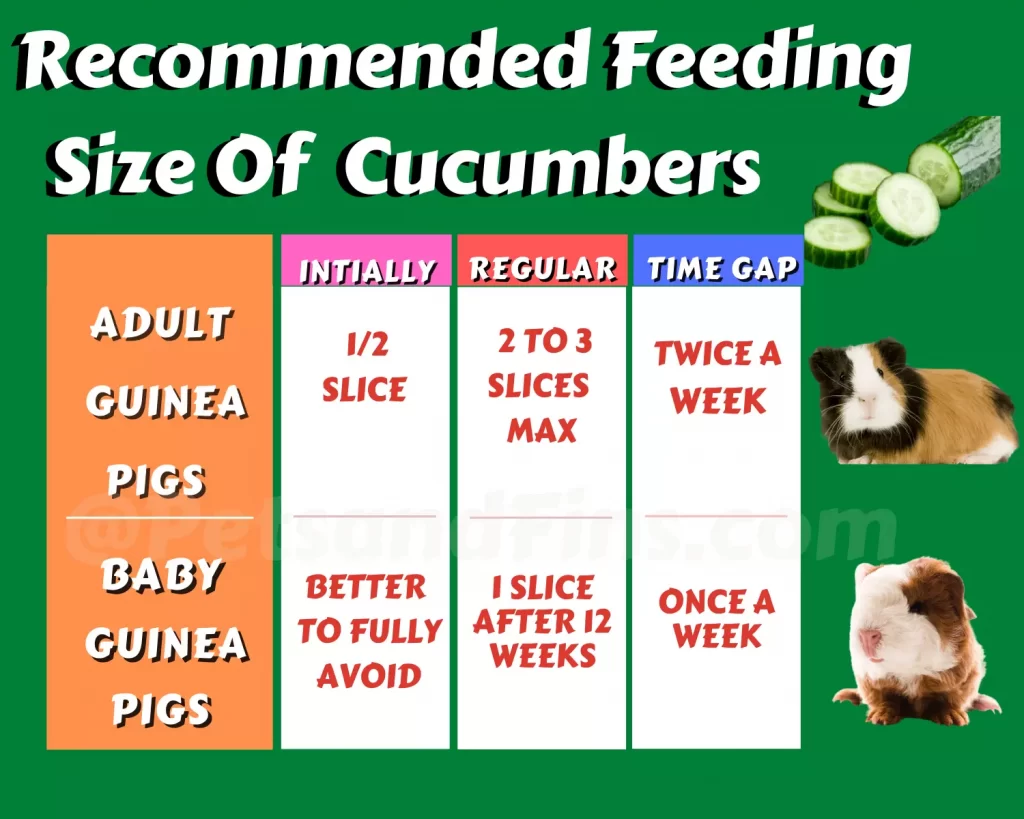
When Is The Best Time To Feed Cucumber To Your Guinea Pig?
It’s best to give cucumber at room temperature or slightly cold.
Cucumbers Can Be A Great Snack For Your Guinea Pig Any Time Of The Day, Such As: –
Morning : You can feed them this fruit as soon as they wake up, and it will help stimulate their appetite for the day ahead of time. This is especially useful if you’re dealing with a finicky eater who doesn’t want to eat anything that early in the morning.
Mid-Day/Afternoon: If your guinea pig wakes up late, then don’t worry about waiting until afternoon before feeding them some cucumbers since there aren’t any real negative effects to doing so.
Evening Time: If you have a guinea pig who gets hyperactive after they eat their dinner, then this is the perfect time to feed them cucumber since it will serve as a calming effect on them while also helping with any digestive problems that might arise later in the night or early morning hours.
Nighttime: Some people like to feed their Guinea pigs cucumbers before putting them back into their cages to sleep at night. This prevents late-night snacking, which can have negative consequences (such as weight gain) and increase belly fat over time, making your guinea pigs more prone to illness.

Steps To Prepare Cucumber For Your Guinea Pig
- Rinse them under cold water before cutting them up to avoid bacterial contamination. This is especially important if you’re going to give your guinea pig cucumber right after buying it from a local store that doesn’t have any sort of refrigeration systems in place.
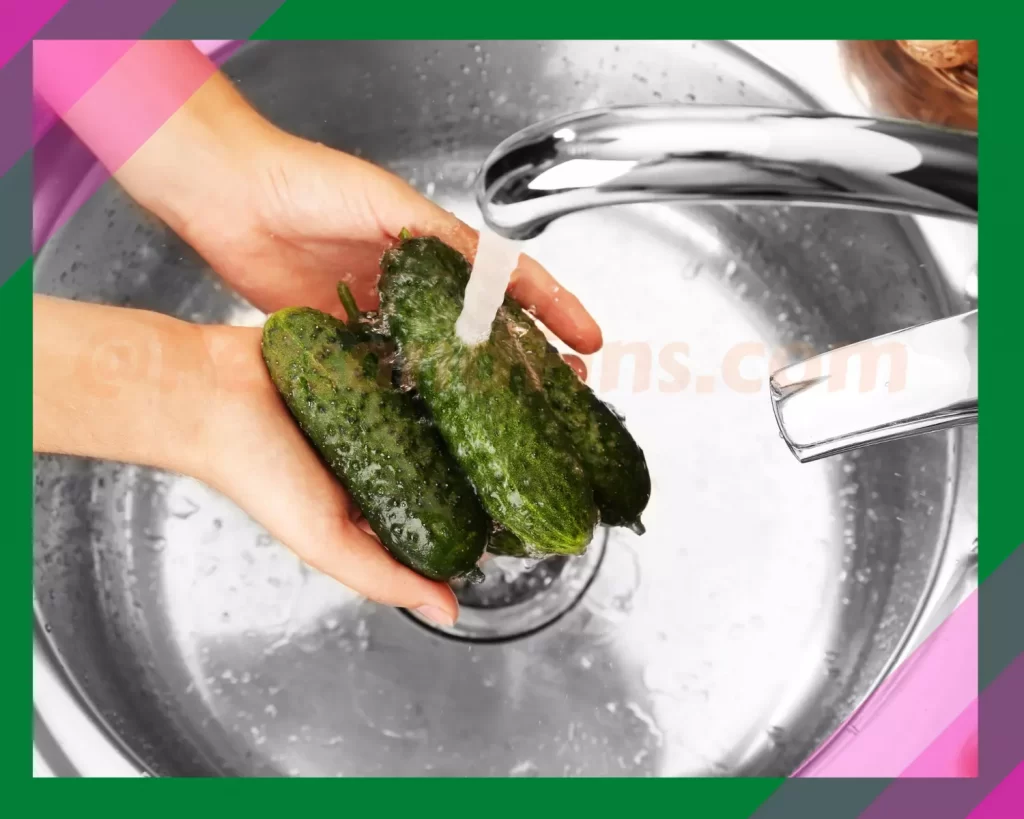
Bacteria can grow rapidly at room temperature, which isn’t good news for our little friends here, who could end up with diarrhea symptoms later on down the road because you didn’t take precautions when handling their food.
- Make sure to cut off the top and bottom ends since they are not fit for consumption purposes.
- Slice up some thin pieces instead of long strips, so that way- they won’t choke on any excess or large chunks while trying to eat something that belongs inside a salad bowl rather than in their bellies! Cut them into slices of about one inch thick or less.
Keep in mind that you can always experiment with the number of slices to give them based on their reaction towards it. You don’t want them to eat too much because this could end up causing diarrhea so start off small at first until you see how they react to cucumbers before trying to increase servings later down the road!
Ways To Add Cucumber To Your Guinea Pig’s Diet :
Cucumbers can be added to your guinea pig’s diet by chopping them up into small pieces and used as a salad mix.
- Mix It With Other Vegetables:You can also chop it up and serve alongside other vegetables such as carrots, celery etc.
- Serve Them Raw:You can also serve raw cucumber slices as a snack by themselves.
- Mix With Their Pellets:You can also mix cucumber slices into their pellets since this will help provide them with extra nutrients that they may not be getting otherwise.
This is especially true if you’re dealing with a guinea pig who is very picky about eating right and doesn’t want to eat anything green or leafy in general- so use some sort of fruit instead!

How Can You Introduce Cucumber To Your Guinea Pig?
Cucumbers can be an intriguing snack for your guinea pig to work with because it can lead towards some interesting results.For example, if your little friend here has never tried them before- they might not even know what to do with it at first.
They’ll likely smell the cucumber and try to lick off any excess water that’s dripping down from it but won’t end up eating the actual fruit itself since this is something totally new for their palette to begin experiencing in quite some time.
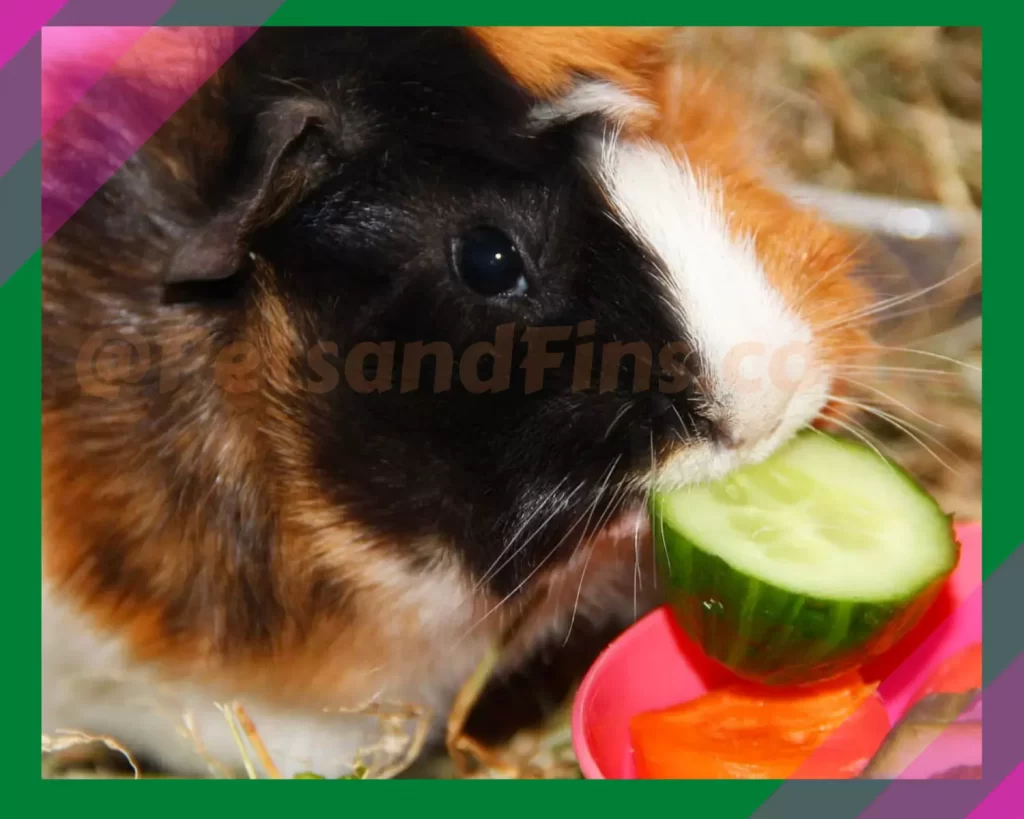
If you’re introducing a new food into their diet, it’s suggested that you mix it together with something they already enjoy eating.
The best way to help them transition into eating cucumber is by mixing it with their pellets or any other food they already enjoy so that you can slowly start phasing out the old and introducing new foods into their diet, one at a time!
It might be best to add cucumber slices as snacks rather than main course meals until your guinea pig gets used to having them in its routine.
What To Do If Your Guinea Pig Has Eaten Too Many Cucumbers?
You can take the following steps to counter the effects of eating too many cucumbers:
- Keep Them Hydrated:If your Guinea Pig has eaten too many cucumber pieces, you can give them some water. This will help their body get rid of excess fluid in the form of urine which helps avoid further complications due to dehydration, such as seizures and urinary tract infections!
- Offer Some Coconut Water :You can also offer some coconut water to help them get rid of excess nutrients.
- Keep An Eye Out For Diarrhea:If they have eaten too many cucumber pieces and start having diarrhea, you should avoid giving your Guinea Pig any more food for at least twenty-four hours until the situation improves! You should then give them their regular diet but in smaller amounts.
- Change Their Diet:You need to change their diet during this time by avoiding fruits for a few weeks. Instead, you should focus on giving your Guinea Pig more proteins and healthy fats. You can then gradually introduce some vegetables back in their diet over the next few weeks to see if they have any allergies or negativeIf your Guinea Pig is suffering from any of the following symptoms you should immediately take them to a veterinarian:
-Lethargy or weakness in muscles
-Diarrhea for more than 24 hours that prevents normal bowel movements which may become bloody
-Inability to eat or drink anything even after several hours
-Swollen abdomen and/or tummy area which is often accompanied by a loss of appetite for more than 24 hours.
-Seizures
Your furry friend may need antibiotics, special fluids given intravenously, and other medications to correct their condition.If you notice these types of behaviors it’s important to take your Guinea Pig to the vet immediately!
Although most cases are not serious and your Guinea Pig will probably recover within a day, if you notice that they are suffering from any of these symptoms, it’s best to get them checked out.

How To Buy The Best Cucumbers For Your Guinea Pig ?
Buying the best cucumbers for your Guinea Pig can help ensure that they are getting all of their daily nutritional needs met.
- Buy Organic :Make sure you find organic cucumbers without wax or pesticides when feeding them to your guinea pig!You should always buy organic produce for your furry friend. This will help avoid giving them any harsh chemicals from nonorganic fruits and vegetables, which may lead to some long term health problems down the road!
- Check For Bruises:Make sure that they have no bruises or soft spots. If you find any cucumbers with these types of issues, it’s best to avoid them and buy a new one.
- Check For Rotten Spots:If you notice any rotten spots, green undertones, or soft spots on the skin of a cucumber, make sure that you don’t feed it to your Guinea Pig! These are all signs that there is something wrong with them and they may cause serious health problems if eaten by your furry friend.
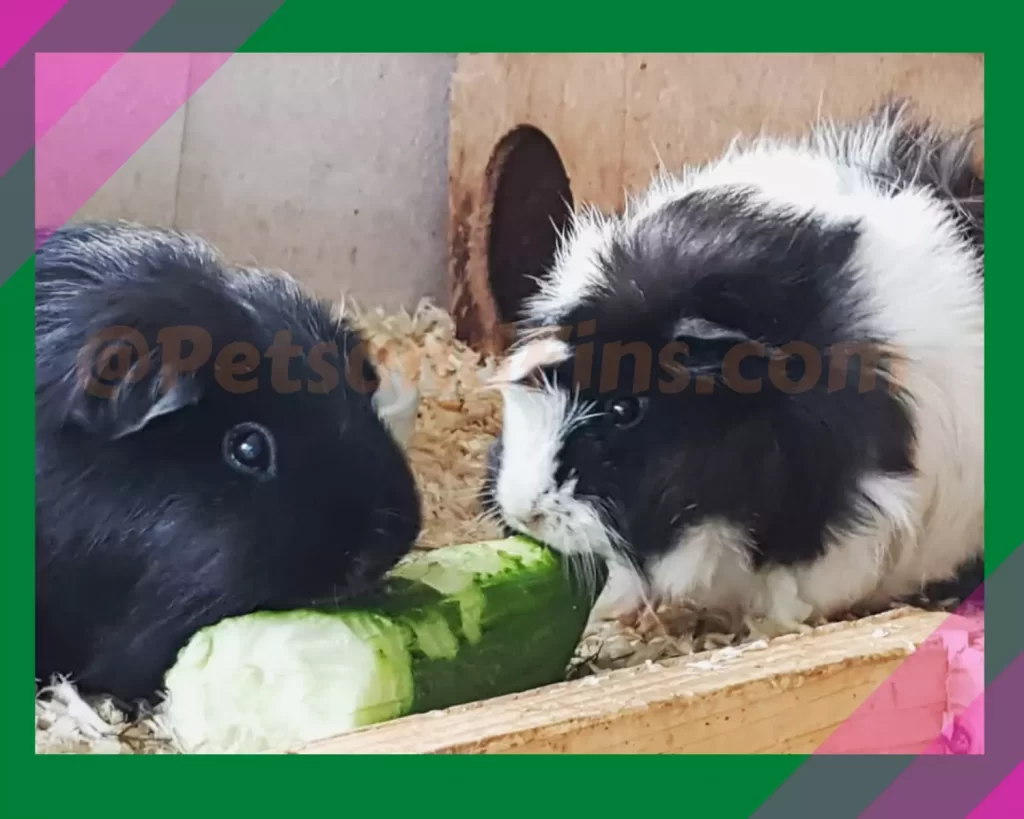
- Test For Firmness:A fresh cucumber is firm all over its entire surface when pressed down on gently with your fingers.If you find cucumbers that feel soft all over, avoid them! They are not fresh and, most likely, they will be spongy or mushy when eaten by your Guinea Pig!
- Check The Stem End:A good indicator is to look at the end of the cucumber that has the stem. If this part looks mushy, it may be a sign that they are rotting and you should avoid buying them if possible!
- Check The Skin:Make sure that the skin is shiny and bright green in color. If you notice any brittleness, cracks, or other problems on their surface, avoid buying them!
- Feel For Thorns:A fresh cucumber should not have any thorns anywhere on its body. If it does, then this means they are old and may be rotting inside, so don’t buy these either.

Wrapping Up
While cucumbers are indeed great as a dietary supplement or even just as a natural treat from time to time- you still need to make sure that your cavy doesn’t overindulge!
It would be best to feed it in moderation as there are not many nutrients in the fruit itself, but it can provide some variety for your pet’s diet if they enjoy eating them.
Give in moderation – you want to make sure that this does not replace other nutritious foods because of its lack of significant nutritional value. But yes! Cucumbers are safe and healthy for guinea pigs too.
It’s important that guinea pigs only have the recommended serving size every day because excess amounts can potentially lead towards health problems down the road.
If you are unsure whether or not your cavy can eat cucumbers, then makeup sure to consult with a licenced veterinarian!
XoXo
Genie
Related Questions:
Can Guinea Pigs Eat Cucumber Seeds?
Yes, guinea pigs can eat cucumber seeds. Cucumber seeds are not toxic for your guinea pigs to munch on and they contain fiber and water, both of which will help keep your pet healthy and hydrated. They also contain a small amount of protein and calcium.
The seeds inside the cucumber also contain antioxidants such as beta-carotene and are low in fat, making them an excellent treat as well!
However, they can eat cucumber seeds in moderation and you should not replace their regular food with the seeds.
Can Guinea Pigs Eat Cucumber Skin/Peel?
Yes, it is safe for your Guinea pigs to munch on the skin of cucumbers. They have high water content that will help your cavy stay hydrated! The skin of the cucumber also contains fiber which is extremely beneficial for your cavy’s digestive system.
The peel has more nutrients than you might think! It actually contains Vitamin C, calcium, and magnesium- all important minerals that help keep your pet healthy. The peels are sometimes even used as natural remedies to cleanse the body (such as in homoeopathic medicine), so make sure not to throw them away.
Make sure you cut off any areas that show bruising or green undertones because these are signs that there may be something wrong with this specific piece of produce.
Can Guinea Pigs Drink Cucumber Juice?
No, it is not safe for Guinea pigs to drink cucumber juice. It has a lot of sugar content, which can make their tummies upset.
Homemade cucumber juice is not harmful to your guinea pig. If you prepare plain cucumber juice at home without adding any extra sugar or other additives, then yes, this can be given to them as a very rare treat.
However, you don’t need to keep in mind that juices of any kind are completely devoid of fibre and hence the nutritional value that juices provide your guinea pig is almost next to nothing.
Can Guinea Pigs Eat Cooked Cucumber?
The answer to this is a No! You can give your guinea pig a raw cucumber instead of a cooked one. They cannot eat cucumbers that are already cooked because this will reduce their nutritional value and also make them lose water content!
It’s easy to overlook the dangers of giving your guinea pig cooked food. You might think that they are safe because it is just like eating a raw cucumber , but this isn’t true!
Guinea Pigs would never come into contact with cooked or heated food in their natural environment.
Even if you cook up some steamed veggies for yourself at home later on down the line (and by all means do!), don’t feed them to your beloved pet.
